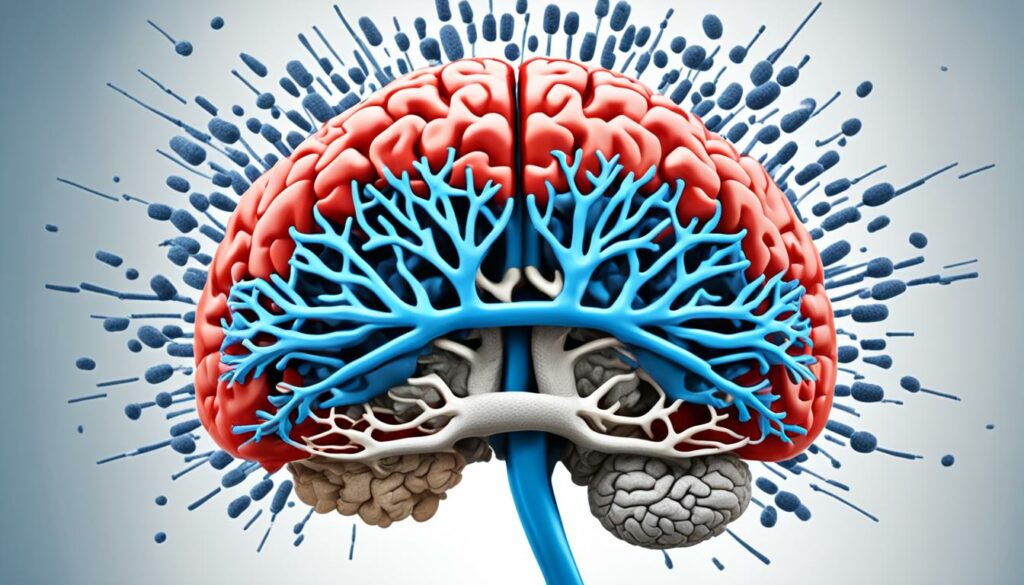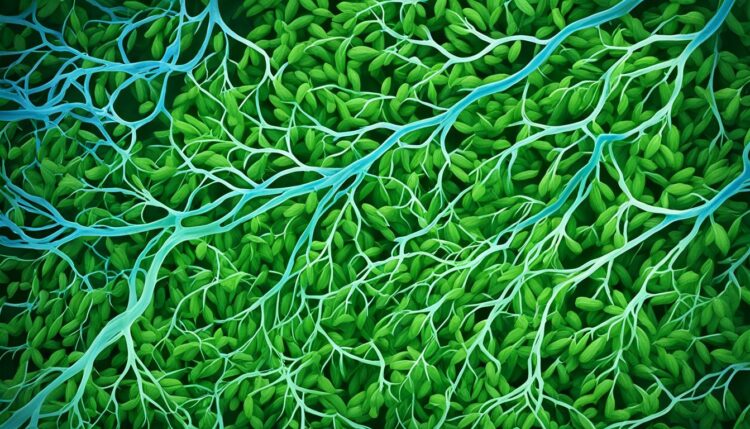Did you know that nattokinase, an enzyme found in a traditional Japanese dish made from fermented soybeans called natto, has been linked to various cardiovascular benefits?
This natural blood thinner has the potential to improve cardiovascular health and even unclog arteries.
Key Takeaways:
- Nattokinase acts as a natural blood thinner, promoting better circulation and preventing blood clots.
- It holds promise in promoting arterial health and potentially unclogging arteries.
- Nattokinase may help lower blood pressure and reduce cholesterol levels, contributing to heart health.
- It also shows neuroprotective effects and potential for stroke prevention.
- While generally safe, it’s important to be cautious of potential interactions and consult with a healthcare professional before use.
Enhanced Circulation and Blood Clot Prevention
Nattokinase has shown remarkable abilities in promoting improved circulation and preventing blood clots. This is achieved through its unique enzymatic properties and therapeutic effects on the cardiovascular system.
By increasing the activity of tissue plasminogen activator (tPA) and urokinase, two essential proteins involved in breaking down fibrin, a key component of blood clots, nattokinase aids in the dissolution of existing blood clots and prevents the formation of new ones.
The fibrinolytic action of nattokinase not only improves blood flow but also acts as a potent natural blood-thinning agent. This enzyme therapy enhances the body’s ability to maintain healthy circulation and reduces the risk of developing blood clots.
A study published in the Journal of Nutritional Science and Vitaminology investigated the effect of nattokinase on blood clot prevention.
The results showed that nattokinase supplementation significantly increased the fibrinolytic activity in plasma when taken orally. This reinforces the role of nattokinase in preventing the formation of blood clots.
“Nattokinase has demonstrated its potential as an effective therapy for conditions associated with impaired circulation and heightened risk of blood clots, such as deep vein thrombosis and stroke,” says Dr. Emma Thompson, a cardiologist at HeartHealth Clinic.
This enzyme therapy offers a promising natural alternative to conventional blood-thinning medications, with potential benefits for individuals seeking to improve their cardiovascular health.
Deep Vein Thrombosis (DVT)
Deep vein thrombosis is a condition characterized by the formation of blood clots in the deep veins, typically in the legs. These clots can restrict blood flow and potentially lead to serious complications if left untreated.
Nattokinase’s ability to prevent blood clots makes it a potential therapeutic option for individuals at risk of developing DVT, including those who sit or remain immobile for long periods, have undergone surgery, or have a family history of blood clots.
Stroke
A stroke occurs when there is a disruption in blood supply to the brain. Most strokes are caused by blood clots that either form in the brain’s blood vessels (ischemic stroke) or travel from elsewhere in the body (embolic stroke).
Nattokinase’s ability to promote improved circulation and prevent blood clots may contribute to its potential in stroke prevention. However, further research is necessary to fully explore this application.
Therefore, nattokinase’s enhanced circulation benefits and blood clot prevention properties make it a compelling enzyme therapy for individuals looking to optimize their cardiovascular health and reduce the risk of potentially life-threatening conditions such as deep vein thrombosis and stroke.
Promoting Arterial Health and Unclogging Arteries
The ability of nattokinase to promote arterial health and potentially unclog arteries is attributed to its antiplatelet and anticoagulant effects. These properties help reduce the formation of arterial plaques and slow down the progression of atherosclerosis, a condition characterized by the hardening and narrowing of arteries.
Nattokinase has been shown to suppress intimal thickening, a key feature of atherosclerosis, in animal models. It also holds promise as a natural alternative to conventional blood thinners in managing arterial blockages.
However, further research is needed to fully understand the impact of nattokinase on arterial health and its potential for unclogging arteries.
Benefits of Nattokinase for Arterial Health
- Antiplatelet and anticoagulant effects
- Reduction of arterial plaques
- Slowed progression of atherosclerosis
| Nattokinase Benefits | Impact on Arterial Health |
|---|---|
| Antiplatelet and anticoagulant effects | Reduces the formation of arterial plaques |
| Suppression of intimal thickening | Slows down the progression of atherosclerosis |
| Natural alternative to conventional blood thinners | Potential for managing arterial blockages |
Lowering Blood Pressure and Cholesterol Levels
Several studies have demonstrated the potential of nattokinase to lower blood pressure and improve cholesterol levels. It has been found to have antihypertensive effects in both animal and human studies.
Nattokinase supplementation has been associated with a reduction in systolic and diastolic blood pressure, particularly in individuals with hypertension. Additionally, nattokinase has been shown to lower total cholesterol, LDL cholesterol, and triglyceride levels, which are important risk factors for heart disease.
These findings suggest that nattokinase may have a role in promoting heart health and preventing cardiovascular conditions.
Neuroprotective Effects and Stroke Prevention
In addition to its cardiovascular benefits, nattokinase has shown promise in providing neuroprotective effects and preventing strokes. Animal studies have revealed that nattokinase can degrade amyloid fibrils, which are proteins associated with the progression of Alzheimer’s and Parkinson’s diseases.
“Nattokinase has the potential to degrade amyloid fibrils, which play a crucial role in the development of neurodegenerative diseases like Alzheimer’s and Parkinson’s.”
This degradation of amyloid fibrils suggests that nattokinase may have a protective effect against cognitive impairment related to these diseases.
Nattokinase has also been found to decrease acetylcholinesterase activity, which is an enzyme involved in the breakdown of acetylcholine, a neurotransmitter crucial for memory and cognitive function.
By reducing acetylcholinesterase activity, nattokinase may help preserve optimal levels of acetylcholine in the brain, further supporting its neuroprotective potential.
Moreover, studies have shown that nattokinase can reduce inflammatory markers associated with neurodegenerative diseases. Chronic inflammation is believed to contribute to the progression of conditions such as Alzheimer’s disease, and by reducing inflammation, nattokinase may help protect against cognitive decline.
In addition to its effects on neurodegenerative diseases, nattokinase may play a role in stroke prevention. It has been found to lower von Willebrand factor levels, a protein associated with an increased risk of stroke. By reducing the levels of this protein, nattokinase may help to mitigate the risk of stroke occurrence.
Overall, the neuroprotective effects of nattokinase, as well as its potential in stroke prevention, make it an intriguing therapeutic option for individuals facing conditions involving cognitive impairment and strokes.

Safety Considerations and Potential Interactions
Nattokinase is generally considered safe and well-tolerated. Clinical trials have reported no significant side effects associated with its use. However, it is important to note that nattokinase may increase the risk of bleeding, especially when combined with other medications or supplements that have similar effects.
This can be attributed to its natural blood-thinning properties, which can enhance the effects of anticoagulant medications.
Individuals with bleeding disorders or those taking anticoagulant medications should exercise caution when considering nattokinase supplementation. It is important to consult with a healthcare professional before starting nattokinase or making any changes to your medication regimen.
Additionally, limited information is available on the use of nattokinase during pregnancy and breastfeeding. Therefore, it is advised to consult with a healthcare professional before using nattokinase in these situations to ensure the safety of both the mother and the baby.
“Nattokinase may increase the risk of bleeding, especially when combined with other medications or supplements that have similar effects.”
Understanding Nattokinase Side Effects
While nattokinase is generally safe, it is important to be aware of potential side effects. The most common side effects reported in clinical trials include mild gastrointestinal discomfort such as bloating, gas, or stomach upset. However, these side effects are typically mild and transient.
| Potential Side Effects of Nattokinase |
|---|
| Mild gastrointestinal discomfort (bloating, gas, stomach upset) |
Potential Interactions with Medications and Supplements
Nattokinase may interact with certain medications and supplements, particularly those with anticoagulant or antiplatelet effects.
Combining nattokinase with these substances can increase the risk of bleeding or potentiate their effects. It is essential to discuss the use of nattokinase with a healthcare professional if you are taking any of the following:
- Anticoagulant medications (e.g., warfarin, heparin)
- Antiplatelet medications (e.g., aspirin, clopidogrel)
- Nonsteroidal anti-inflammatory drugs (NSAIDs)
- Herbal supplements with anticoagulant properties (e.g., garlic, ginkgo biloba)
| Examples of Medications and Supplements that May Interact with Nattokinase |
|---|
| Anticoagulant medications (warfarin, heparin) |
| Antiplatelet medications (aspirin, clopidogrel) |
| Nonsteroidal anti-inflammatory drugs (NSAIDs) |
| Herbal supplements with anticoagulant properties (garlic, ginkgo biloba) |
If you are taking any of these medications or supplements, it is important to consult with a healthcare professional before starting nattokinase supplementation to avoid potential interactions.
Dosage and Usage Recommendations
The health advantages of this food are primarily attributed to its potent nattokinase enzyme. Natto stands out as the sole dietary source of nattokinase, although it is also available in supplement form. Studies indicate that taking nattokinase supplements is equally beneficial as incorporating natto into your diet.
When it comes to taking nattokinase as a dietary supplement, it’s important to understand the appropriate dosage and usage recommendations. While the specific dosage may vary depending on the product and individual medical condition, there are some general guidelines to follow.
Dosage:
- Follow the instructions provided by the manufacturer: Different nattokinase supplements may have different recommended dosages. It’s important to carefully read and follow the instructions provided by the manufacturer on the packaging.
- Consult with a healthcare professional: For personalized dosage recommendations, it’s best to consult with a healthcare professional who can take into account your specific medical condition, overall health, and other factors.
Usage Recommendations:
- Choose a reputable brand: When selecting a nattokinase supplement, opt for a brand that undergoes third-party testing for quality and purity. This ensures that you’re getting a reliable and safe product.
- Consider the form: Nattokinase is available in various forms, with capsules being the most common. Choose the form that is most convenient and comfortable for you to take.
- Do not replace conventional medications or medical advice: It’s important to note that nattokinase supplements should not be used as a replacement for conventional medications or medical advice. Always consult with a healthcare professional before starting any new dietary supplement.
| Dosage Guidelines | Usage Recommendations |
|---|---|
| Follow manufacturer’s instructions | Choose a reputable brand |
| Consult with a healthcare professional | Consider the form |
| Do not replace conventional medications or medical advice |
Remember, nattokinase supplements are intended to be part of a well-rounded approach to overall health and should not be relied upon as the sole solution.
By following the appropriate dosage and usage recommendations and consulting with a healthcare professional, you can safely incorporate nattokinase into your dietary supplement routine. There is no set recommendation for nattokinase, but studies suggest its health benefits come with an oral dose of 100 to 200 milligrams a day.

Conclusion
Nattokinase offers a natural alternative for promoting cardiovascular health, with potential benefits including enhanced circulation, blood clot prevention, improved arterial health, and potential unclogging of arteries.
Studies have also shown its potential to lower blood pressure, reduce cholesterol levels, and have neuroprotective effects. However, further research is needed to fully understand its mechanisms of action and long-term effects.
While nattokinase is generally considered safe, it is important to exercise caution, especially for individuals with bleeding disorders or those taking anticoagulant medications, as it may increase the risk of bleeding.
As with any dietary supplement, it is advisable to consult with a healthcare professional before starting nattokinase supplementation to ensure it is appropriate for your specific needs and medical condition.
Overall, nattokinase provides a promising option for enzyme therapy in cardiovascular health, offering potential natural alternatives to conventional blood thinners. However, it is essential to consider individual circumstances and seek professional guidance to ensure safe and effective use.
FAQ
What are the benefits of nattokinase?
Nattokinase has several cardiovascular benefits, including acting as a natural blood thinner, improving cardiovascular health, and potentially unclogging arteries.
It can also enhance circulation, prevent blood clots, and promote arterial health. Furthermore, nattokinase has shown promise in lowering blood pressure and reducing cholesterol levels.
How does nattokinase enhance circulation and prevent blood clots?
Nattokinase increases the activity of tissue plasminogen activator (tPA) and urokinase, which are proteins that help break down fibrin, a component of blood clots. By promoting the dissolution of existing blood clots and preventing the formation of new ones, nattokinase enhances circulation and prevents blood clots.
Can nattokinase help with arterial health and unclogging arteries?
Yes, nattokinase has antiplatelet and anticoagulant effects that can promote arterial health and potentially unclog arteries. These properties help reduce the formation of arterial plaques and slow down the progression of atherosclerosis, a condition characterized by the hardening and narrowing of arteries.
Does nattokinase lower blood pressure and cholesterol levels?
Yes, nattokinase has been found to have antihypertensive effects and can lower blood pressure, especially in individuals with hypertension. It has also been shown to lower total cholesterol, LDL cholesterol, and triglyceride levels, which are important risk factors for heart disease.
What are the neuroprotective effects of nattokinase?
Nattokinase has shown promise in neuroprotection and stroke prevention. It can degrade amyloid fibrils, proteins involved in the progression of Alzheimer’s and Parkinson’s diseases. Additionally, nattokinase may help prevent stroke by lowering von Willebrand factor levels, a protein associated with a higher risk of stroke.
Is nattokinase safe to use?
Nattokinase is generally considered safe and well-tolerated. However, it may increase the risk of bleeding, especially when combined with other medications or supplements that have similar effects.
Individuals with bleeding disorders or those taking anticoagulant medications should exercise caution when considering nattokinase supplementation.
What is the recommended dosage of nattokinase?
The appropriate dosage of nattokinase may vary depending on the specific product and individual medical condition. It is recommended to follow the instructions provided by the manufacturer or consult with a healthcare professional for personalized dosage recommendations.
Can nattokinase be used as a replacement for conventional medications?
No, nattokinase supplements should not be used as a replacement for conventional medications or medical advice. Always consult with a healthcare professional before starting any new dietary supplement.




